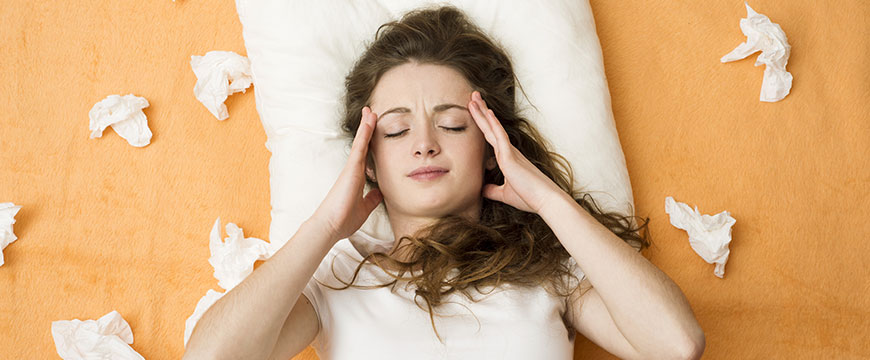
If you have allergies, you may want to breathe a long, sneeze-free sigh of relief as winter approaches. Unfortunately, the chilly weather that puts pollen-producing trees and grass to sleep can also keep people inside, increasing their chance of developing indoor allergies.
Winter may appear to provide a respite for people with outdoor allergies, but it also presents new issues for interior allergy sufferers.
As you spend more time indoors, you may become exposed to common allergens such as dust mites, pet dander, cockroaches, and mold.
If you suffer from indoor allergies, here are tips from allergy specialists on dealing with them and reducing your exposure.
Dust mites
Dust mites flourish in temperatures of 70 degrees or higher and humidity levels exceeding 75 percent. Turning down the thermostat and using a dehumidifier can help to lessen their presence in your home.
You can reduce dust mite droppings by encasing your mattress, box springs, and pillows in allergen-proof fabric or plastic covers. You also should wash your bedding regularly in hot water and dry in a hot dryer.
If you are allergic to dust mites, the AAAAI recommends regularly removing wall-to-wall carpeting and cleaning throw rugs.
With all of this in mind, you should note that you cannot eliminate dust mites and will continue to be allergic to them. The only thing you can do is to make your home and body as unfriendly to them as possible.
If you develop dust mite allergies, you can use plenty of medications to your advantage.
Medications such as antihistamines, corticosteroids, and decongestants may offer some relief. Nasal irrigation systems like the Neti Pot can help flush out irritants.
You also should take advantage of immunotherapy, which involves training the immune system to become less susceptible to mites using tablets or shots.
Cockroaches
Cockroach droppings are an allergen; thus, the AAAAI recommends blocking all openings, crevices, and windows where the bugs could enter your home.
Similarly, replace and plug all leaking faucets and pipes to prevent cockroaches from getting the water they require to survive.
Cleanliness is also a defense against roaches. Keep food covered and wash all dishes, including pet food dishes, after each use. After meals, vacuum and clean the floor and dispose of rubbish in cans with tight lids.
You should also regularly clean your stove and other kitchen surfaces and behind appliances where crumbs tend to accumulate.
Household pets
Most doctors recommend that those who are allergic to animal dander should avoid having pets with feathers or fur.
This is because there are no such things as hypoallergenic pets.
Certain proteins in hairy animal saliva, dead skin flakes, or urine cause allergic reactions in humans. According to the AAAAI, all dogs and cats carry these proteins.
To stay safe, you should keep your pet away from the bedroom and other areas where you spend a lot of time.
You should also sweep carpets regularly using a vacuum with a HEPA filter, and consider removing any wall-to-wall carpeting and leaving bare floors.
Bathing and brushing your pets regularly may help lessen symptoms. If you have animal allergies, avoid grooming your pets; if you have to groom them, wear a mask.
When you are not at home, keep pets out by closing your bedrooms’ doors and covering the vents with a bulky material such as cheesecloth.
Animal allergens are sticky. To remove the allergen, frequently wash and replace your animal’s favorite furniture and toys.
Indoor mold
Repairing and sealing leaky roofs or pipes and using a dehumidifier in moist basements can help prevent indoor mold. To avoid mildew, empty the water pan and clean the units regularly.
You can clean any mold that has formed on hard surfaces with water, soap, and a 5% bleach solution.
Avoid installing carpet on concrete or damp flooring, and don’t store objects in damp areas of your home.
When should you see an allergy doctor?
In most cases, when you do the above, you have few chances of having allergies. Even if the allergies come, they often go away after some time and aren’t too problematic.
While this is the case, in some cases, they become so severe that you have to see a doctor. Some of the situations when you have to see a doctor include:
Symptoms Persist: If your symptoms persist despite taking over-the-counter allergy medications or using home remedies to decrease allergen exposure, it’s best to seek medical attention.
Severe allergy symptoms: Symptoms such as prolonged coughing, wheezing, difficulty breathing, or chest tightness, necessitate rapid medical care.
Impact on Daily Life: If your indoor allergies have a substantial impact on your daily activities, work, or sleep, you should see a doctor for additional evaluation and treatment.
Allergy Testing: Consult an allergist if you believe specific indoor allergens are affecting your symptoms. Allergy testing can help determine triggers and direct specific treatments.
Medication Side Effects: If you have unpleasant reactions to allergy drugs or find them ineffective, your doctor can offer other therapies or changes to your present medication regimen.
Chronic or recurring sinus infections may be associated with indoor allergens. A doctor can assess your symptoms and provide suitable treatment.
Development of New Symptoms: If you acquire new or worsening allergy symptoms, especially if they differ from your regular indoor allergy symptoms, it is important to get medical attention for a thorough examination and diagnosis.
Remember that everyone’s allergy triggers and symptoms are unique, so consult an allergy doctor Germantown MD for specialized guidance and treatment tailored to your specific needs.
The last thing you can do is take the medication meant for someone else or go for a treatment regimen designed for another person.
When hiring an allergy professional, don’t hire the first one you come across. Instead, you should take your time and find an experienced and reputable one to help diagnose and treat the condition.




